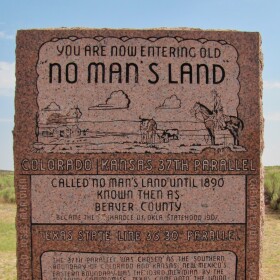
Our Nowhere: Panhandle Histories delves deep into the fascinating narratives that have shaped the Oklahoma and Texas Panhandles throughout time. This unique region, often overlooked in mainstream historical accounts, comes alive through carefully researched stories that highlight its distinctive character, cultural heritage, and historical significance. The collaboration between hosts Dr. Gary Girod and Dr. Rebekah Wagenbach (both professors at Oklahoma Panhandle State University) brings academic rigor and engaging storytelling to each episode.
The podcast creates a rich tapestry of regional history by weaving together the expertise of local historians with the fresh perspectives of students. Through their combined efforts, listeners gain insight into the complex social, economic, and cultural forces that have shaped this distinctive corner of the American landscape, from its indigenous roots to its role in the development of the American West.
We at HPPR are pleased to partner with Oklahoma Panhandle State University to bring you this program. For the full-length episodes, please visit here.
Our Nowhere: Panhandle Histories airs on HPPR Mix every Friday morning at 5:45am and 7:45am Central Time.
-
This week, we continue our ghost hunt with guest host and history major Alison Bernal, interviewing another Guymon local about paranormal activity at the famous "Ghost School", Academy North, in Guymon, OK.
-
This week, we continue our ghost hunt with guest host and history major Alison Bernal, who interviews a teacher about her experiences with paranormal activity at the famous "Ghost School", Academy North, in Guymon, OK.
-
Today's episode is a ghost hunt, and we investigate the famous "Ghost School", Academy North, in Guymon, OK, with guest host Alison Bernal.
-
Another local, but uncorroborated story, comes from the Wichita Eagle; there are claims by locals that young Bonnie and Clyde may have spent time in and around Hugoton, Kansas, near the Oklahoma panhandle, possibly living as "Jewel and Blackie Underwood".
-
In June of 1933, things were getting desperate for Bonnie and Clyde. They can't operate as they have in the past, as they're wanted; additionally, because of this, money was limited, and the glamorous lifestyle they'd lived on the road was no longer possible.
-
"You've read the story of Jesse James, of how he lived and died; if you are still in need of something to read, here's the story of Bonnie and Clyde." - From 'The Trail's End', a poem by Bonnie Parker
-
There are many stories of outrageous things that happened in No Man's Land, and almost all of them begin with a cowboy drinking too much. One man who couldn't seem to catch a break was Bill Williams of Gate City.
-
Frontier justice was the only justice in No Man's Land, and a culture of vigilantism developed. In one case, when an inebriated man started firing wildly in the middle of Beaver City, the residents promptly shot him, and quietly buried him, without incident.
-
The big draw in any settlement in No Man's Land was alcohol and moonshine. Virtually any place with more than two houses had a saloon or a general store where ranchers could spend their paychecks on booze. It's not hard to see why spirits became so popular; aside from working the fields or pasture lands, there was very little to do but drink, and get into fights.
-
Neutral Strip 1 - better known as "No man's land", existed in a legal limbo. Texas gave up the strip so that it could legally keep slavery, and neighboring territories such as Kansas, wanted to take the land for themselves. Cherokee, who had been forced off their land in Georgia, and traveled on the Trail of Tears, claimed the land should belong to them.











